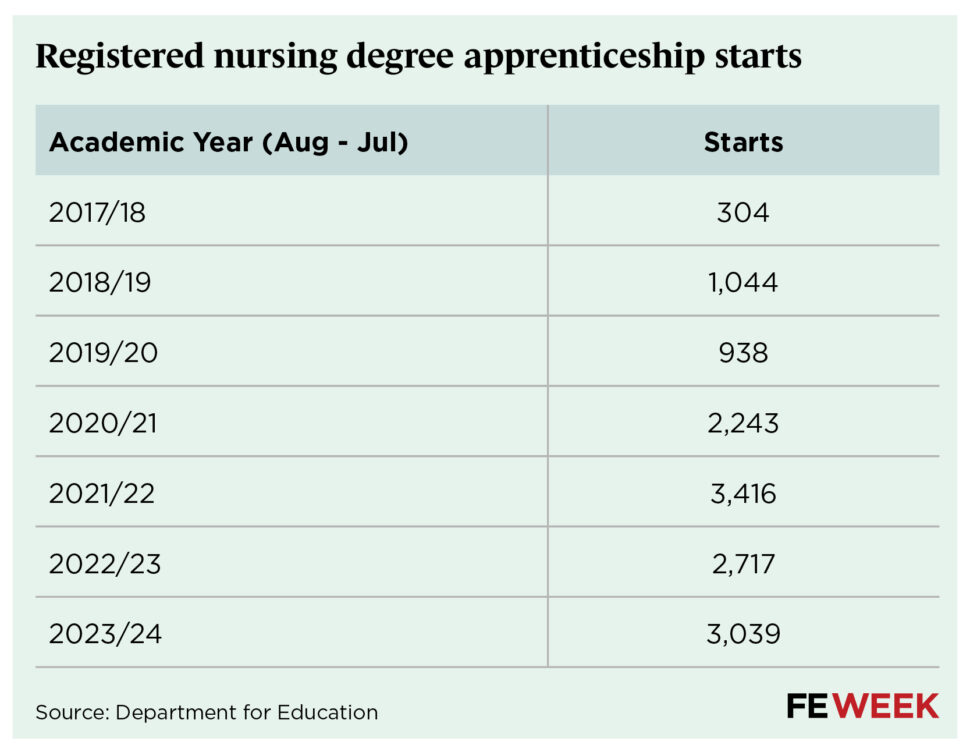The government’s fresh target of 2,000 more nursing apprenticeships has been described as “less ambitious” than pledges made when the Conservatives were in power.
In its “10 Year Health Plan for England”, published last month, the government pledged to recruit an extra 2,000 nursing apprentices over the next three years.
The Department of Health and Social Care (DHSC) hopes the target will help improve career opportunities for people from working-class backgrounds and support people into healthcare roles “within their communities”.
The apprenticeship target has been welcomed as a “positive step” by health sector experts, who say the NHS has workforce shortages in the “tens of thousands”.
However, this appears to be less than a target set in the 2023 NHS long-term workforce plan, which aimed for apprenticeships to account for about 20 per cent of the 40,000 nursing training intake by 2028.
Nuffield Trust researcher Lucina Rolewicz said: “The commitment to add 2,000 extra nursing apprenticeships over the next three years should be welcomed, however this does represent a less ambitious commitment than that detailed in the previous long-term workforce plan – which aspired to almost 9,000 nursing apprenticeships by 2028/29.”
Between 2020-21 and 2023-24 academic years, annual starts on the level 6 registered nurse degree apprenticeship were between 2,200 and 3,400, according to Department for Education statistics.
Mandy Crawford-Lee, chief executive of the University Vocational Awards Council, agreed that the 2,000 new apprenticeships target is a “small contribution” while Dr Rocco Friebel, associate professor of health policy at the London School of Economics (LSE), called the figure “modest”.
The nursing apprenticeship pledge is the only apprenticeship training target revealed in the 10-year health plan, ahead of a “refreshed” long-term workforce plan expected later this year.
The refreshed workforce plan is expected to be “very different” to the 2023 version as staff in 2035 will be “better treated, more motivated, have better training and more scope to develop their careers”.
Target ‘not sufficient’?
Royal College of Nursing (RCN) head of students Lorna Mayles said: “The College welcomes alternate routes into nursing to address the immediate and future supply problems that continue to put patient care at risk.
“It must be recognised, however, that the apprenticeship route is not sufficient to solve workforce gap issues.
“The reality is that to recruit the highly skilled nurses we need at scale and speed, the government must deliver new investment in nursing education, in both apprenticeships and traditional degrees.”
The DHSC has been contacted for comment.
Despite concerns about nursing staff shortages, NHS statistics suggest nurse numbers in England are the highest in at least fifteen years and vacancy rates are the lowest in at least seven years.
Some newly qualified nurses have also reportedly struggled to find work in the NHS due to a hiring freeze and overseas recruitment.
There are about 25,600 vacancies of full-time equivalent nursing and midwifery posts in England – about six per cent of the total planned posts. This is the lowest rate since comparable statistics began in 2018, when the rate was about 12 per cent.
The overall number of nurses and health visitors working in the NHS is currently 368,000, a gradual increase from about 280,000 ten years ago.

Apprenticeship v university
Most experts also agreed that expanding the apprenticeship route into nursing is a “positive step” that offers an alternative to “traditional university-based training”.
Dr Friebel, at the LSE, said the route is a “realistic career option” for workers who want to avoid university debt or are unable to study full-time due to life circumstances.
“However, 2,000 additional places over three years is modest when considered against the backdrop of the challenges facing the NHS,” he added.
“We are dealing with workforce shortages in the tens of thousands, and demand for nursing services will only increase as the population ages and the burden of chronic disease grows.
“Apprenticeships will help, but they cannot be relied upon as a single solution. They should complement, not replace, other measures such as sustained investment in university-based nurse training, targeted international recruitment, and strategies to improve retention among the existing workforce.”
Crawford-Lee said some NHS trusts have “struggled” to make nursing apprenticeship degrees their primary training intake.
She added: “Challenges including managing the supernumerary status of apprentices, affording apprentice salary costs, funding the off-the-job learning requirement and backfill have all acted as a brake on the level of take up by NHS Trusts.
“One of the solutions to this has been the use of the nursing associate apprenticeship as a route into nursing for diverse groups that provides a stepping-stone to progress to the registered nurse degree apprenticeship after two years.”















All professional registered nurse training, whether via full-time undergraduate degree or degree apprenticeship, is through validated degree courses at accredited higher education institutions. – Not ‘Apprenticeship v university’.